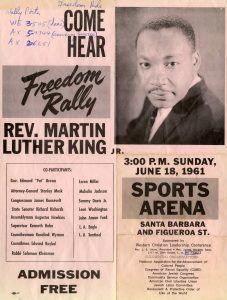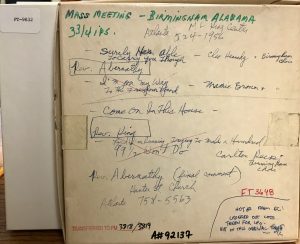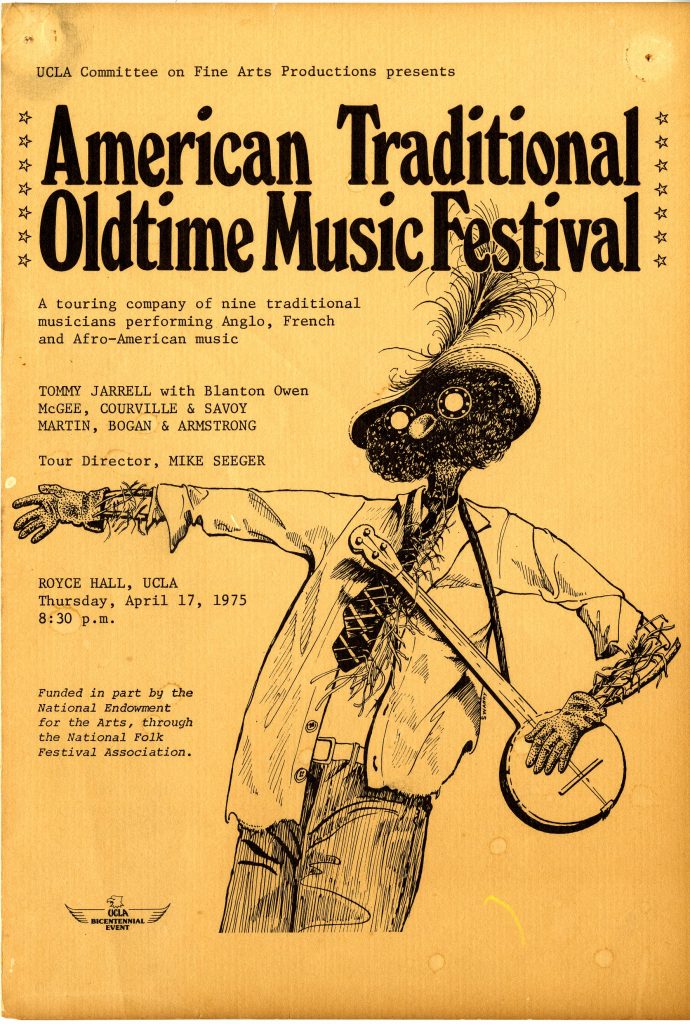
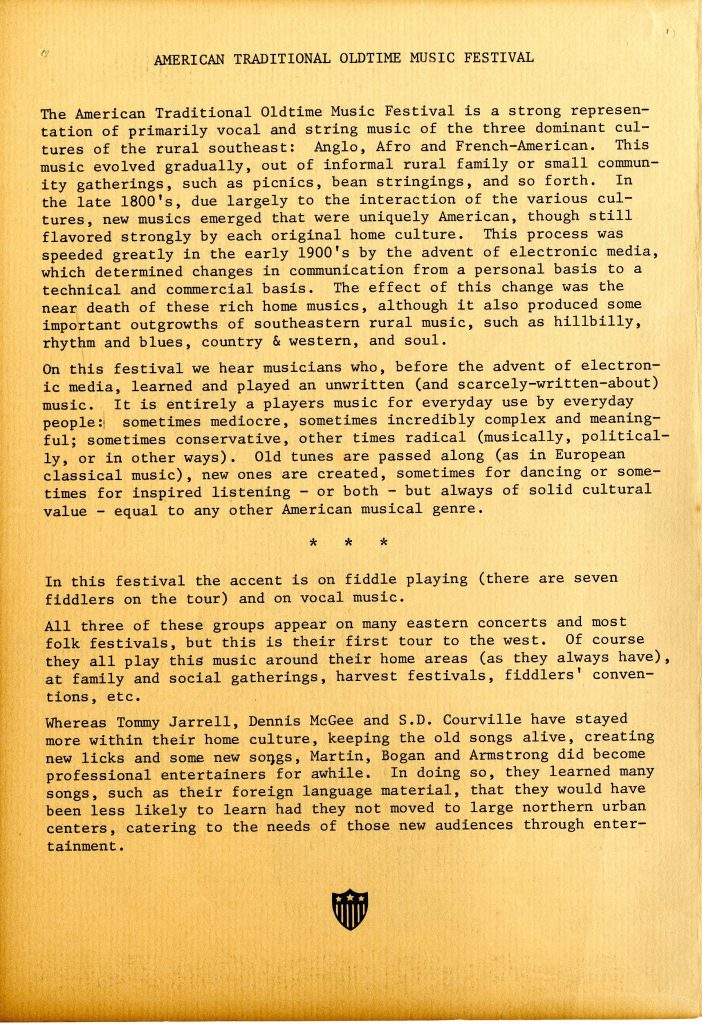 The American Traditional Old-time Music Festival was a touring festival of old-time musicians directed by Mike Seeger in 1975-76. This brochure, Folder 2877 in the D.K. Wilgus Papers (20003), is from the April 17, 1975 stop at UCLA. Song and interview recordings from throughout the tour can be found in the Mike Seeger Collection (20009), most of which are digitized: FS-20009/9655-9662,9688-9696. Here is one to get you started: Dennis McGee and Sady Courville, April 20, 1975 (FS-20009/9693).
The American Traditional Old-time Music Festival was a touring festival of old-time musicians directed by Mike Seeger in 1975-76. This brochure, Folder 2877 in the D.K. Wilgus Papers (20003), is from the April 17, 1975 stop at UCLA. Song and interview recordings from throughout the tour can be found in the Mike Seeger Collection (20009), most of which are digitized: FS-20009/9655-9662,9688-9696. Here is one to get you started: Dennis McGee and Sady Courville, April 20, 1975 (FS-20009/9693).
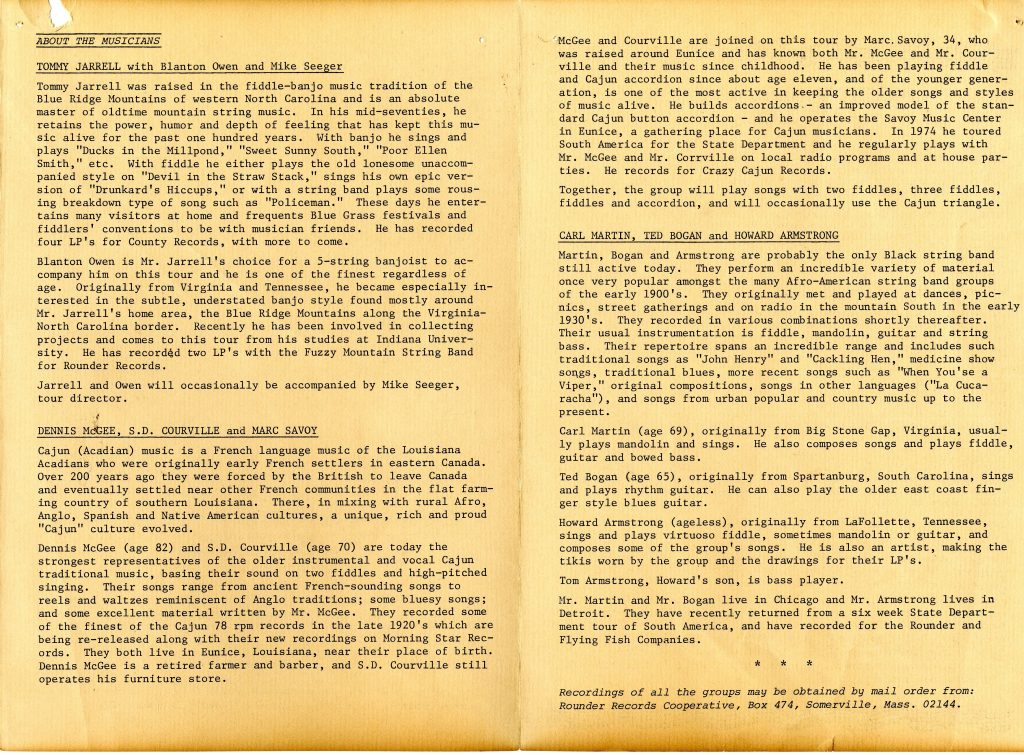
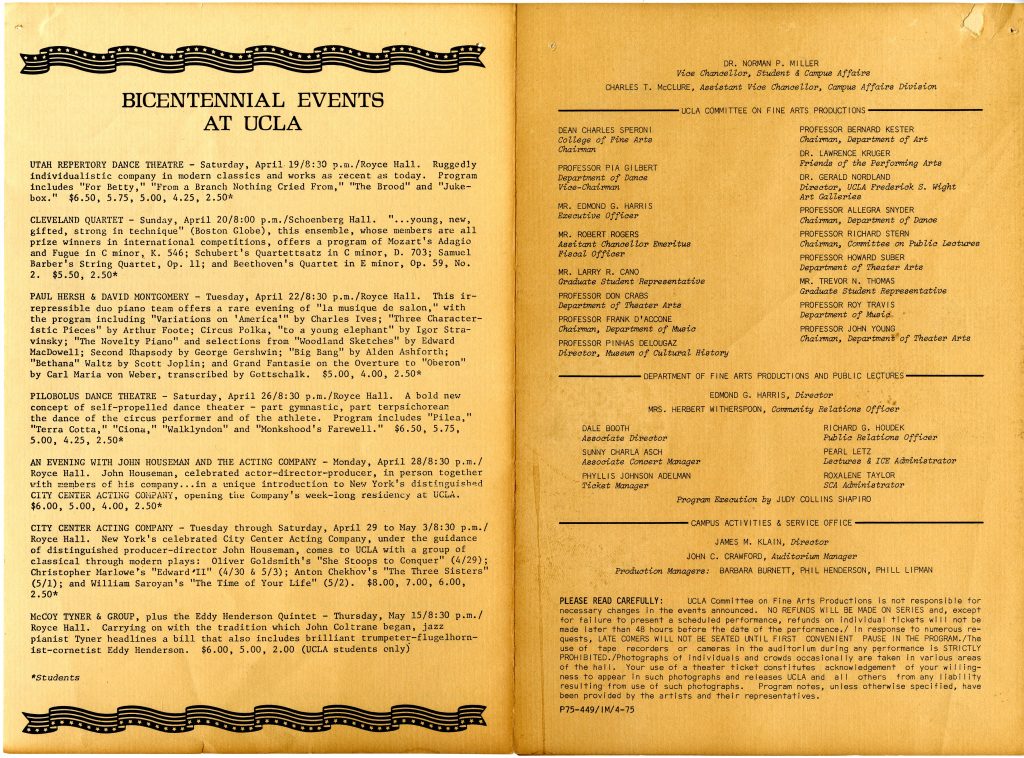
Category: Collections
"We seen it right here didn't we?": Austin through the art of Micael Priest
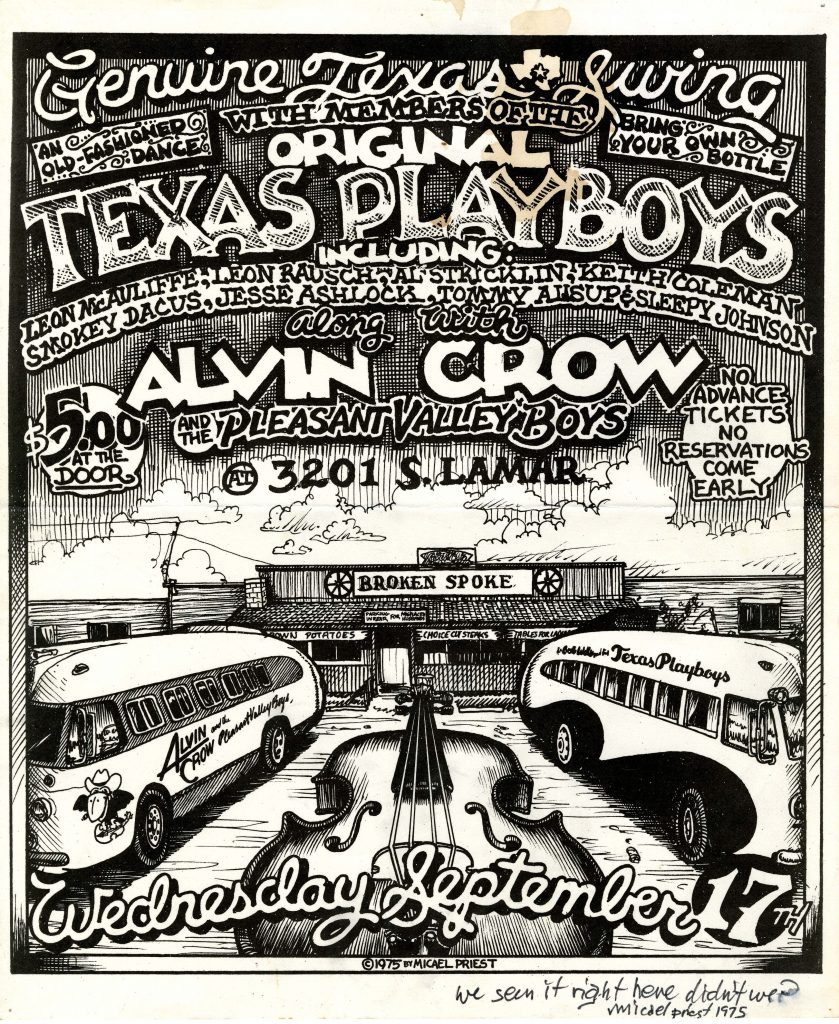 The Southern Folklife Collection is honored to hold a number of collections of individual poster artists including the Ron Liberti Collection (20398), Casey Burns Collection (20415), Jason Lonon Poster Collection (20451), Matt Hart Poster Collection (20457), Steve Oliva Collection (20506), Skillet Gilmore Poster Collection (20468), Clark Blomquist Collection (20465), as well as the work of many other artists represented across the collections, like that of Micael Priest whose work can be found in Folders 3218-3240 in the Archie Green Papers (20002). Priest died yesterday at the age of 66.
The Southern Folklife Collection is honored to hold a number of collections of individual poster artists including the Ron Liberti Collection (20398), Casey Burns Collection (20415), Jason Lonon Poster Collection (20451), Matt Hart Poster Collection (20457), Steve Oliva Collection (20506), Skillet Gilmore Poster Collection (20468), Clark Blomquist Collection (20465), as well as the work of many other artists represented across the collections, like that of Micael Priest whose work can be found in Folders 3218-3240 in the Archie Green Papers (20002). Priest died yesterday at the age of 66.
Artist Micael Priest moved to Austin, Texas in 1969 and quickly became an active participant in the city’s growing counterculture. As a member of the famed music venue Armadillo World Headquarters’ Art Squad from 1972-1980, he created hundreds of iconic images that document the people, places, and activities of the music scene in the form of posters advertising upcoming shows, AWHQ calendars, advertisements, and record covers. With an instantly recognizable visual style, Priest’s posters distill the spirit of a community and, along with the work of his fellow AWHQ crew Jim Franklin and Kerry Awn, imbues such a strong sense of place that it serves as a simulacrum of an Austin that blurs the real and the remembered until the boundaries seem to disappear.
Folklorist Archie Green recognized the power of Priest’s work while teaching at UT Austin in the mid-1970s. Always an ethnographer, Green collected a number of posters, clippings, recordings and more documenting the “cosmic cowboy” scene at the Armadillo and around the city. In memory of Micael Priest we wanted to share a couple of these.
Below is the now famous poster for Willie Nelson’s first show at the club, August 12, 1972, arguably one of the most significant performances in Nelson’s career that marked his turn away from Nashville and toward his own unique sound. Above is one of my personal favorites featuring Alvin Crow and the Original Texas Playboys at the Broken Spoke. I had the fortune of growing up not 1/2 mile from the Broken Spoke, and despite the best efforts of “New Austin,” I am very glad to report that it’s still there, still honky-tonkin, and the Shiner beer is still cold. Priest’s note handwritten on the bottom of the poster is a prescient comment on the importance of his work and of all poster artists in the historical record. A comment that celebrates the general sense of wonder those cosmic cowboys and post-hippie hipsters must have felt to be able to attend shows like this on a regular basis — singular moments in music history that transcended the commercial drive of the social scene.
“We seen it right here didn’t we?”
Go on easy, Micael Priest.
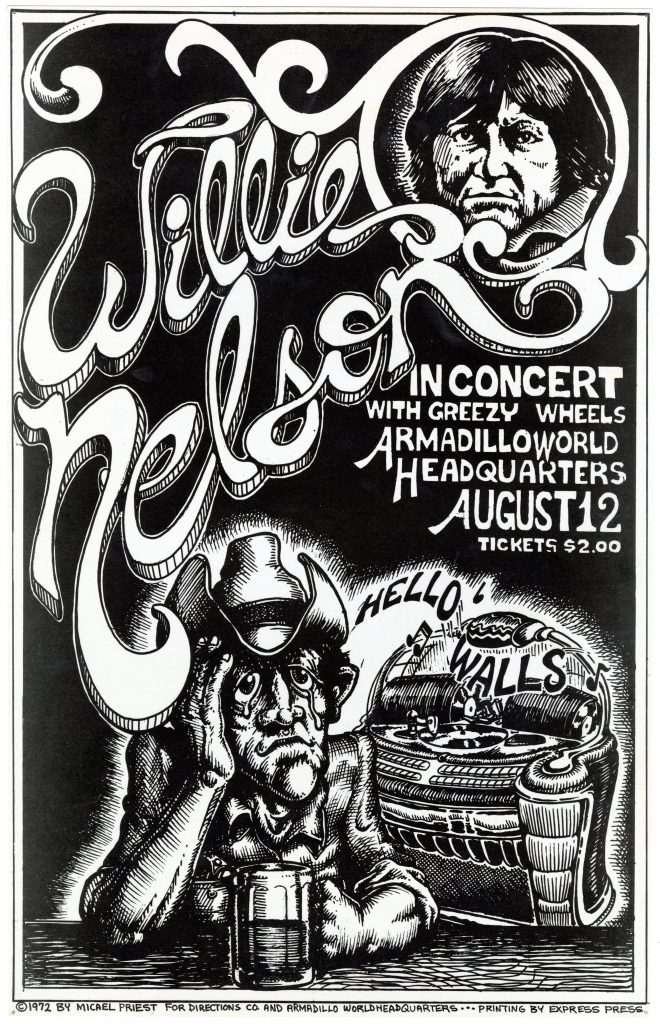
Cousin Emmy: Looking for a Name
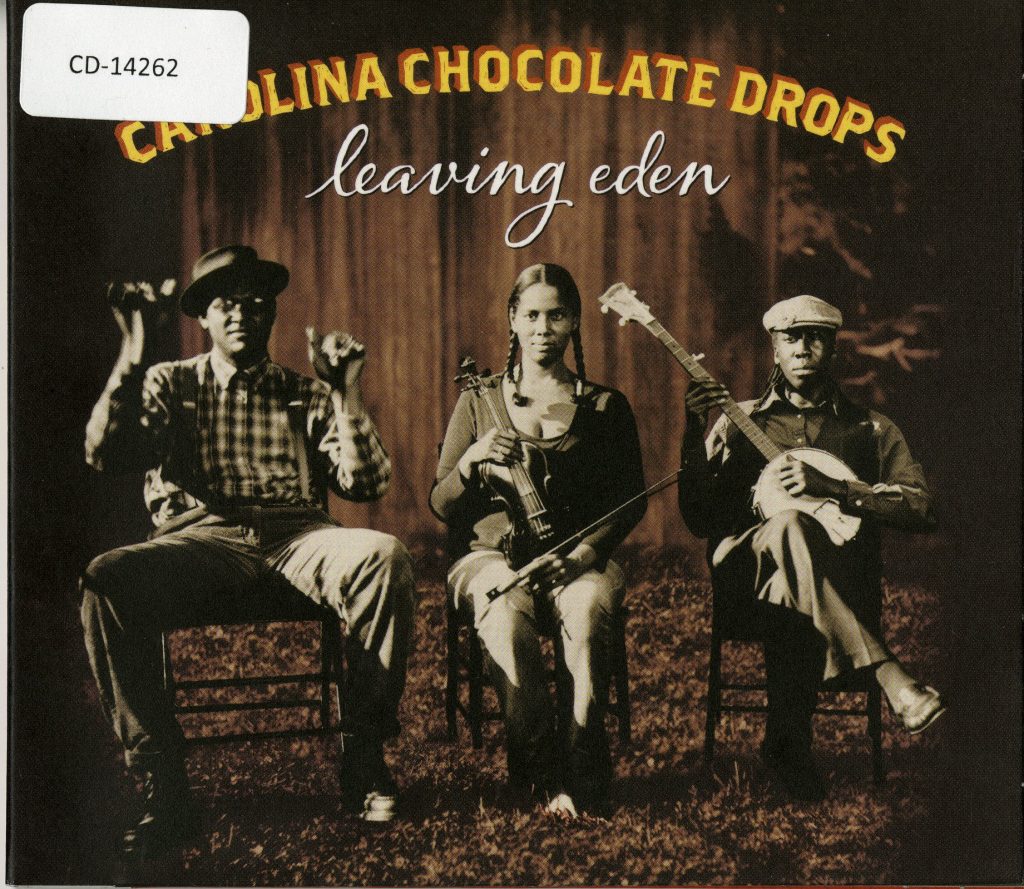 Last year, while writing a final research paper on the Carolina Chocolate Drops’ wonderful 2012 album, Leaving Eden, I encountered the music of the late hillbilly performer Cousin Emmy. The Carolina Chocolate Drops had covered her single “Ruby” for the album, notably adding a beat boxer for their arrangement. I loved the song, and the difficulty of finding anything beyond variations on the same basic biography of Emmy was intriguing. Besides wondering how her actual childhood and life compared to the brief anecdotes I found mentioned constantly, I came upon a more simple question: what was her real name?
Last year, while writing a final research paper on the Carolina Chocolate Drops’ wonderful 2012 album, Leaving Eden, I encountered the music of the late hillbilly performer Cousin Emmy. The Carolina Chocolate Drops had covered her single “Ruby” for the album, notably adding a beat boxer for their arrangement. I loved the song, and the difficulty of finding anything beyond variations on the same basic biography of Emmy was intriguing. Besides wondering how her actual childhood and life compared to the brief anecdotes I found mentioned constantly, I came upon a more simple question: what was her real name?
In theory, the answer was as simple as the question: several credible sources mentioned Cynthia May Carver as Cousin Emmy’s real name. However, the 1946 Decca single that featured “Ruby” credited the songwriter as one “Joy May Creasy.” When the Osborne Brothers had their first hit on MGM Records in 1956 with their rendition of “Ruby Are You Mad,” the song was simply credited to Cousin Emmy, suggesting that Joy May Creasy and Cousin Emmy were one and the same. This seemed to be further confirmed by an oft-cited 1943 Time magazine profile that claims Cousin Emmy was christened Joy May Creasy outside Lamb, Kentucky. After searching pictures of gravestones, countless liner note mentions, copyright renewals, and census records, I had found many more instances of both names, including some minor variations (Mae instead of May, Jo rather than Joy, etc.). I felt that I could safely conclude that both these names held some truth, and the variation in reporting was probably due to a failed (and unmentioned) marriage, the use of pet names, and/or some other unknown factor.
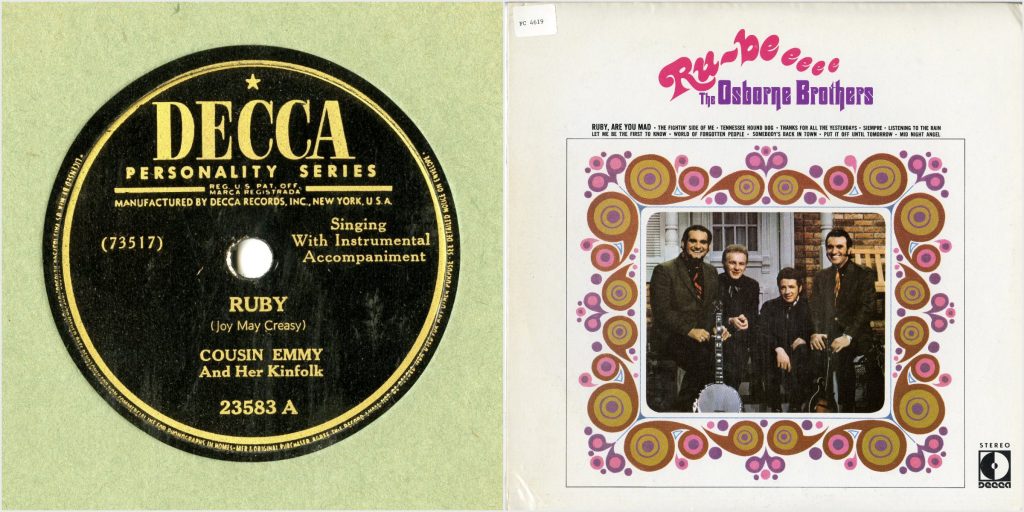
This summer, I was fortunate to begin working here in the Southern Folklife Collection, where I have been exposed to a wealth of information on early hillbilly performers like Cousin Emmy. As I pulled items for researcher questions and digitization, I began to revisit Cousin Emmy and to try to add some more context to her story. I settled on a simple goal: find a resource that mentioned both Joy May Creasy and Cynthia May Carver, or at least something that explained the difference.
In the SFC Song Folio Collection (30006), I found Chimney Corner Songs, FL-0137, which offered an interesting biography of Cousin Emmy and her fellow performers. Although it did not specifically mention her real name or a marriage, it led me to two different, illustrative sources in the Special Collections and Archives at Berea College. First, I searched a similar songbook collection and found a songbook that includes a biography for Johnny Creasy, the announcer on Cousin Emmy’s show, that also mentions his attraction to Cousin Emmy. Chimney Corner Songs was published and largely credited to John Lair, whose papers and correspondence are held at Berea. In that correspondence is a 1941 letter from Cousin Emmy, in which she champions herself and her husband, an announcer: “My husband is a very good announcer. We both work nice together.”
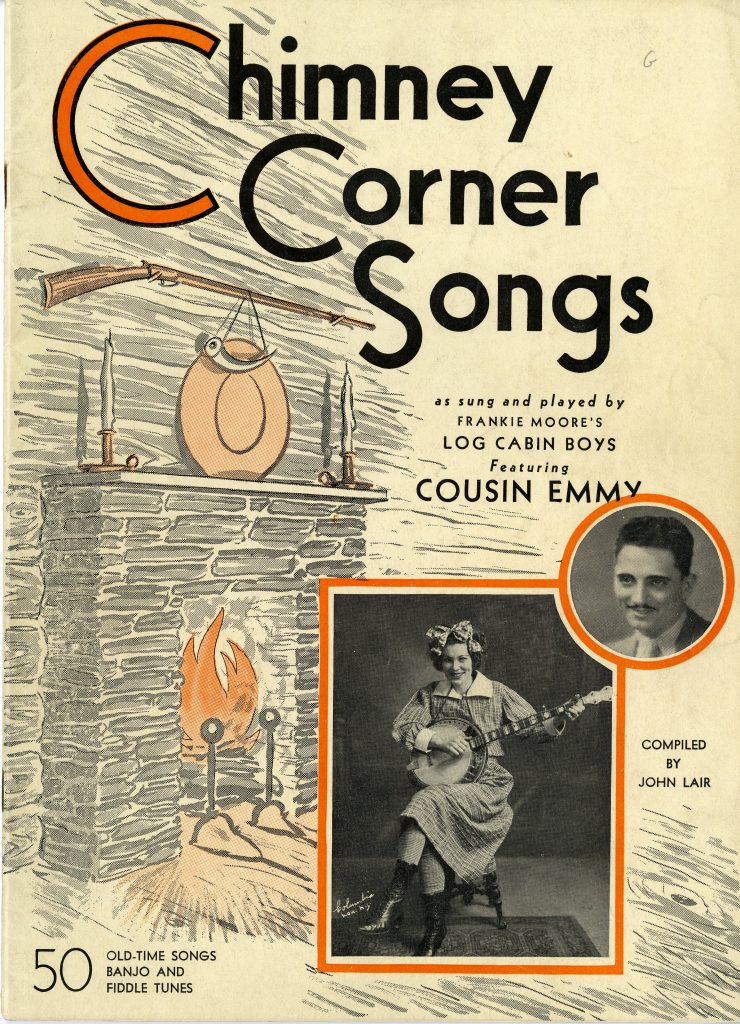
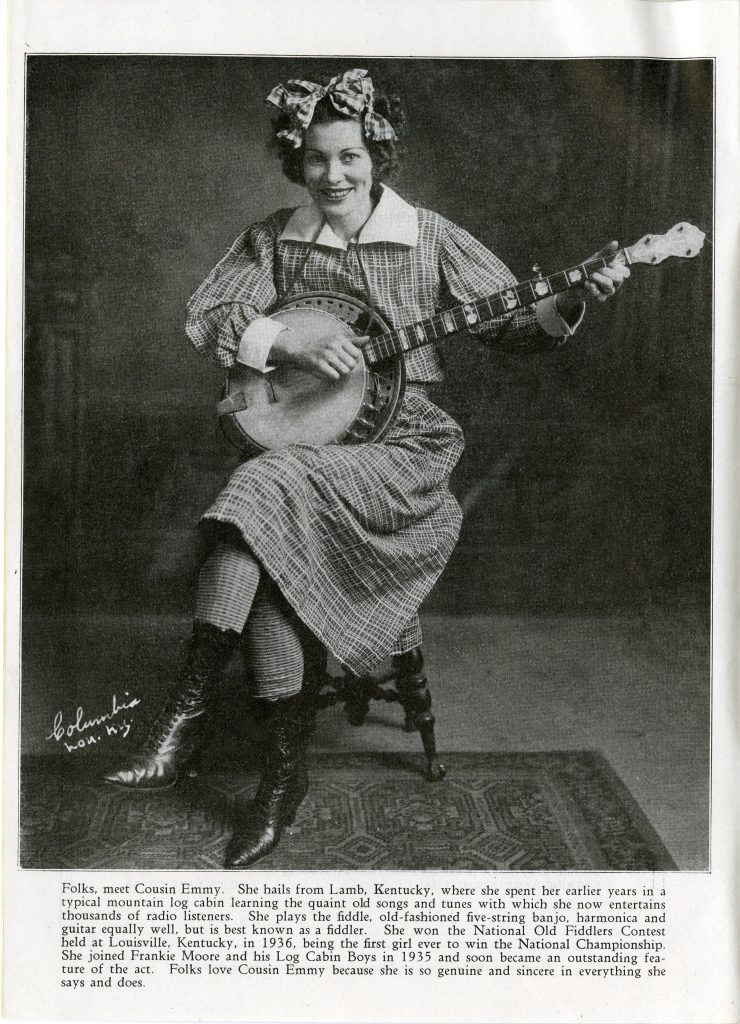
So, Cousin Emmy was born Cynthia May Carver outside Lamb, Kentucky. At least at some point, she also went by Joy. She was married to a Johnny Creasy (whose first name might have been Alfred) for some time, despite many claims, including in the Time article, that she had never married.
Of course, I also found a scribbled note card in the SFC Artist Name File (30005) for Cousin Emmy, NF-538, that states “Cousin Emmy was married to Joe Fred White before she was in radio (He’s in Florida).” In the Entertainment Industry Magazine Archive, an online database, I found a small blurb in a 1949 issue of Variety magazine:
“St. L.’s ‘Cousin Emmy’ Divorced
St. Louis, June 14
Elmer Schaller, farmer living at Lenzburg, Ill., near here, last week won an uncontested divorce from his wife, who has been the “Cousin Emmy” of KMOX’s early a.m. hillbilly program. Couple was married April, 1945, and separated March, 1948. Mrs. Schaller has been a radio entertainer for seven years.”
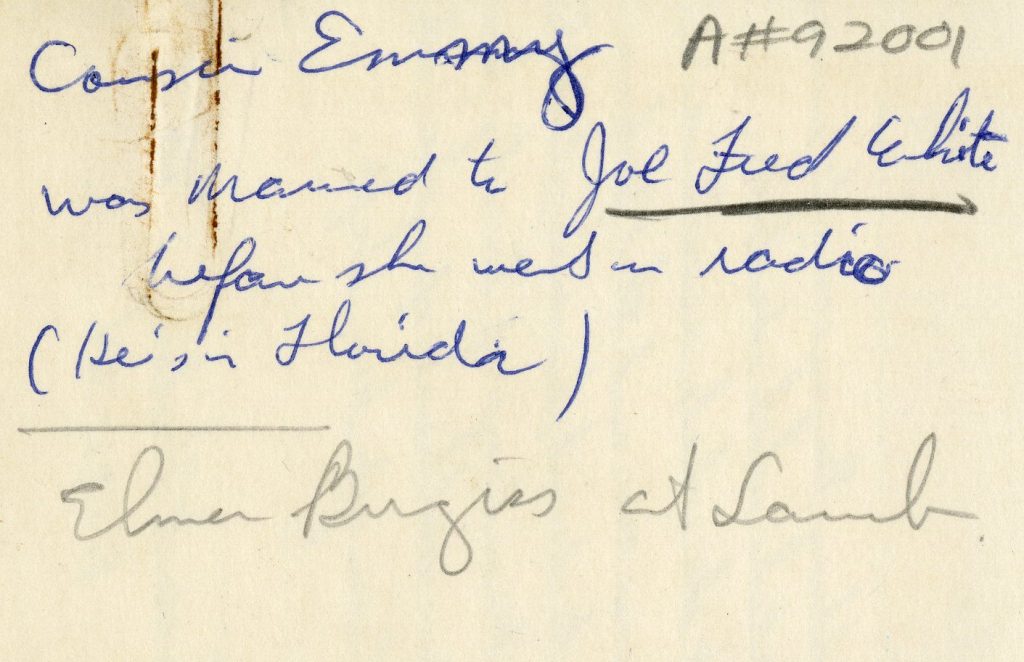
Cousin Emmy’s on-stage persona and biographical information were constantly being tailored to her audience, from hillbilly music on the radio to the folk revival with Alan Lomax in the 1940s and the New Lost City Ramblers in the 1960s. Separating all the details of her life from the stories spinning all around her would surely be an impossible task, but I plan on putting on “Ruby” and digging around a little more.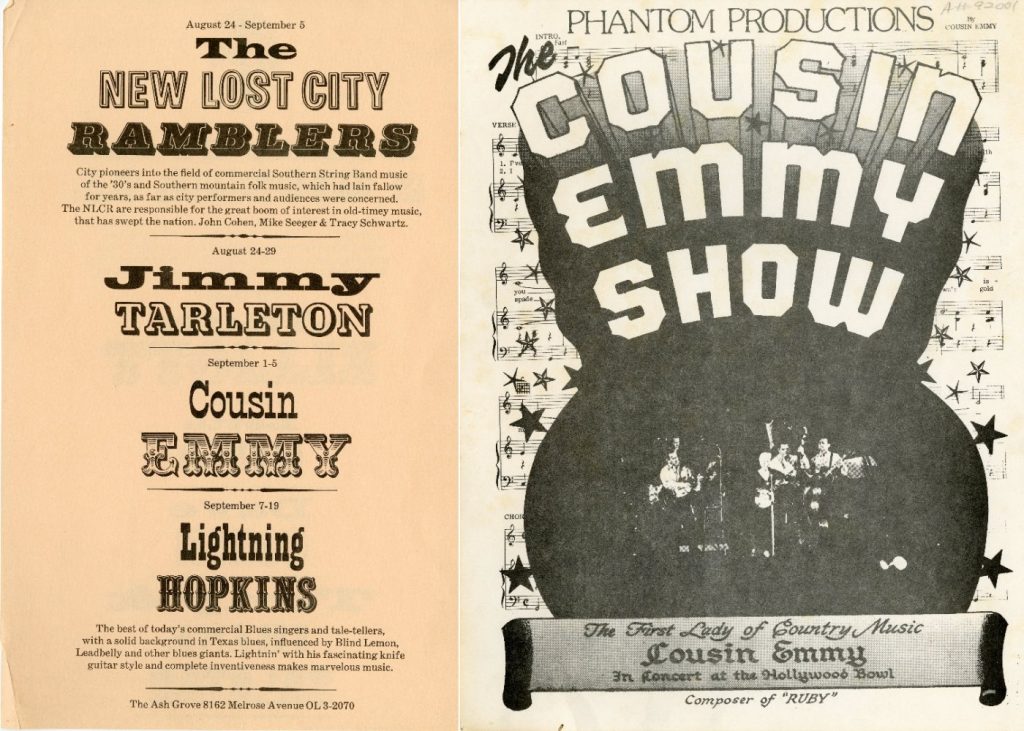
78 of the week: "Droan Waltz"
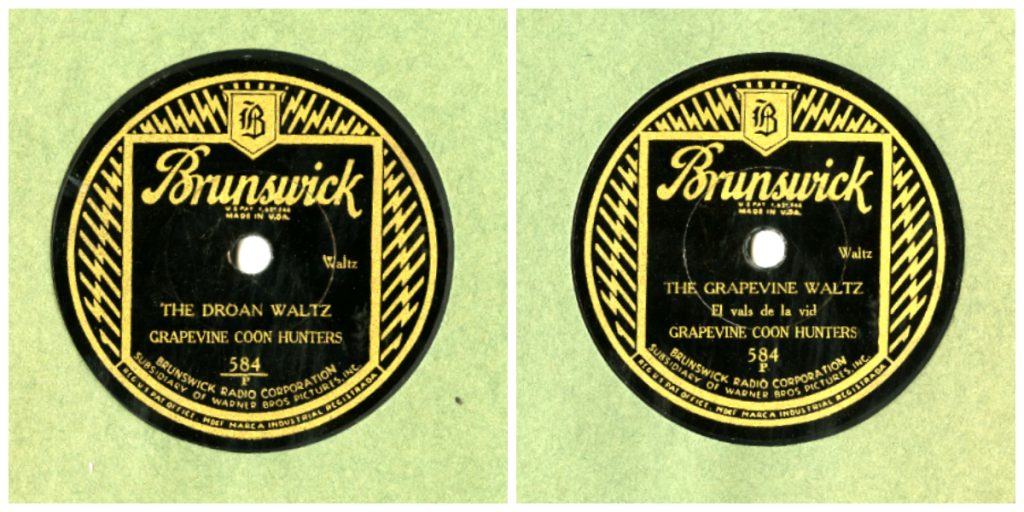 There is not much information about the Grapevine Coon Hunters, a stringband out of Grapevine, Texas that operated in the late 1920s and early 1930s. A research request put us onto a 78 rpm disc released on the Brunswick label in 1932. The disc includes two recordings from a November 1930 recording session in Dallas, Texas, including the mysteriously named “Droan Waltz”
There is not much information about the Grapevine Coon Hunters, a stringband out of Grapevine, Texas that operated in the late 1920s and early 1930s. A research request put us onto a 78 rpm disc released on the Brunswick label in 1932. The disc includes two recordings from a November 1930 recording session in Dallas, Texas, including the mysteriously named “Droan Waltz”
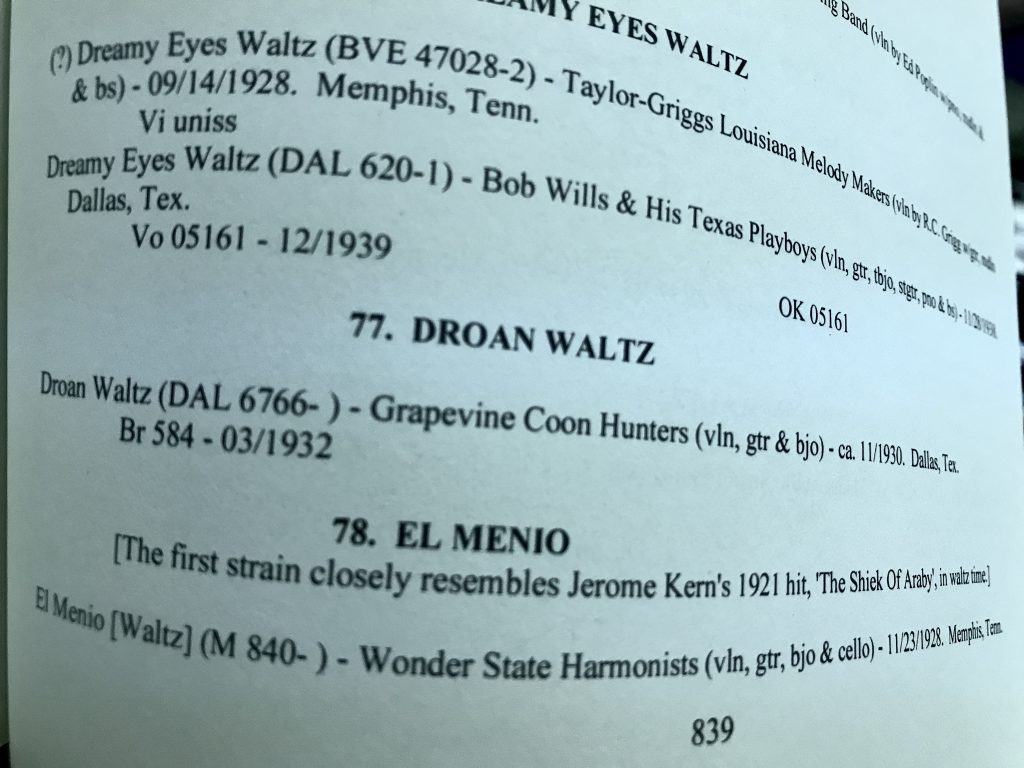 We checked Country Music Sources: A Biblio-Discography of Commercially Recorded Traditional Music by Gus Meade, Douglas Meade, and Dick Spottswood for other recordings, but only came up with this single disc. The recording on the opposite side is “Grapevine Waltz” but the label interestingly includes a Spanish title as well, “El Vals de la Vida.”
We checked Country Music Sources: A Biblio-Discography of Commercially Recorded Traditional Music by Gus Meade, Douglas Meade, and Dick Spottswood for other recordings, but only came up with this single disc. The recording on the opposite side is “Grapevine Waltz” but the label interestingly includes a Spanish title as well, “El Vals de la Vida.”
In folder 457 of the Guthrie T. Meade Collection (20246) we found some handwritten notes about the Grapevine Coon Hunters and another related stringband, The Grapevine Rabbit Twisters. Meade’s notes are citations from local newspapers, The Grapevine Sun and Dallas Morning News, about upcoming radio broadcast appearances and the songs performed on the air. If any readers out there have more information about the Grapevine stringband scene ca. 1930, or if you want to do more research into the Meade Collection, please contact the Southern Folklife Collection or visit at Wilson Library. 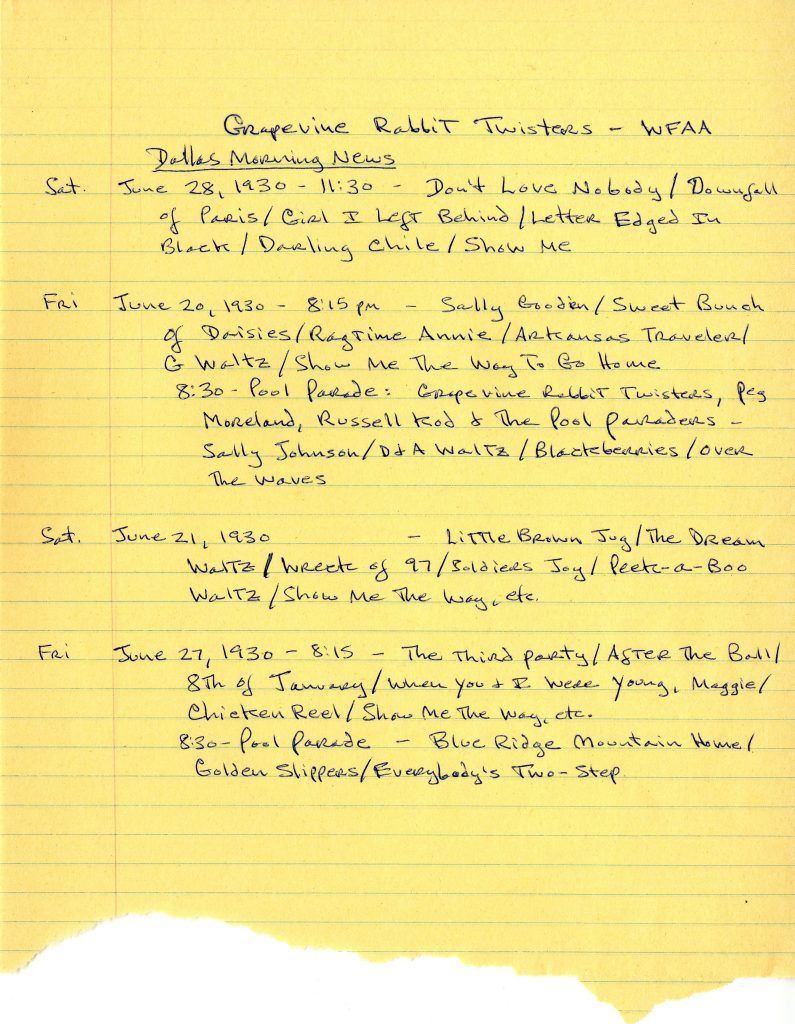
Now Available for Research: Duck Kee Studio Collection
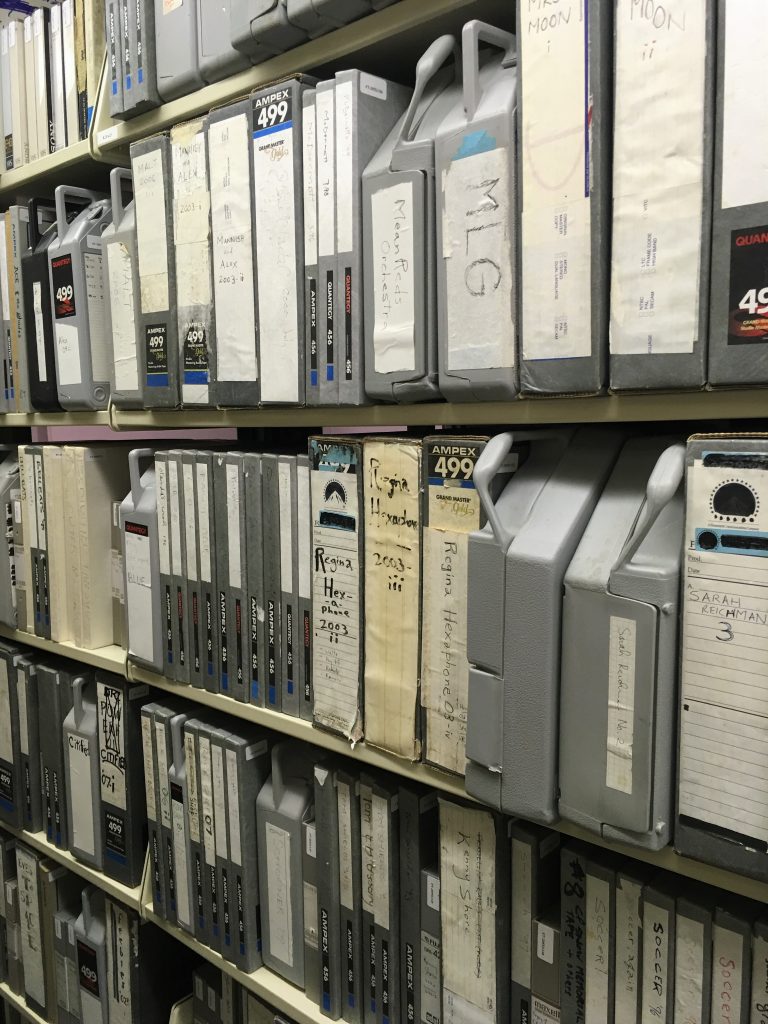
This week we published a new finding aid for the Duck Kee Studio Collection (20553), which contains multi-track and mixdown studio master tapes of Triangle favorites recorded at Duck Kee Studio from 1984-2009. Recordings are on 2″ open reel, 1/2″ open reel, and ADAT analog formats.
Duck Kee Studio was founded by musician and recording engineer, Jerry Kee (Dish, Regina Hexaphone, Cat Toy), who began recording local bands out of a house in Raleigh in the late 1980’s. In 1995, Kee relocated the studio to Mebane, N.C., its eighth location.
The studio has close ties to the Triangle’s indie rock music scene, recording early work by Archers of Loaf, Tift Merritt, Pipe, Polvo, and Superchunk, among others. Kee has historically relied on analog recording equipment, including a 4-track and later a 24-track tape machine.
In January 2018, Duck Kee Studio no. 8 was tragically damaged in a fire. Kee recently talked with WUNC’s “Songs We Love” podcast about the fire, which destroyed his recording equipment and severely damaged open reel tapes stored at the studio.
Thankfully Kee donated a large batch of master tapes (about 175 in total) to the Southern Folklife Collection before the studio fire. These tapes are featured in the newly published finding aid and include recordings by local acts, like Cobra Kahn, Dish, Eyes to Space, Jennyanykind, Malt Swagger, Picasso Trigger, Portastatic, Queen Sarah Saturday, Regina Hexaphone, Schooner, and Superchunk.
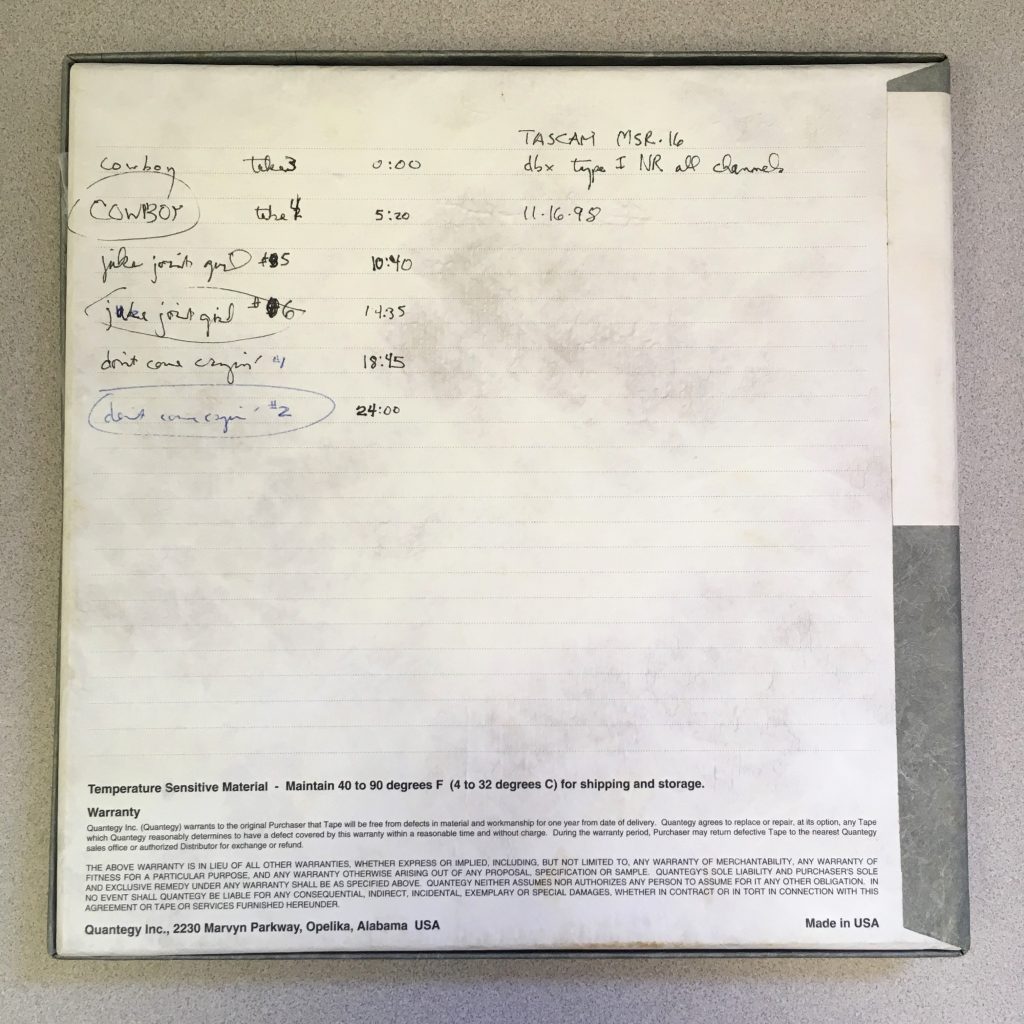
The collection also includes an early recording of Tift Merritt with her full band, dubbed The Carbines, which included Margaret White on fiddle, Christopher Thurston on bass, Greg Readling on keyboard and pedal steel, and Zeke Hutchins on drums. Above is an image of their fall 1998 recording that resulted in a self-released 7-inch single featuring “Juke Joint Girl” and “Cowboy” (1999, Oil Rig Music).
Duck Kee Collection materials are available for research on-site at Wilson Special Collections Library. The collection is a nice addition to the SFC and its growing collection of materials related to the Triangle’s independent music scene (Ron Liberti Collection, Merge Records Collection, Tift Merritt Collection, and Craig Zearfoss Collection, to name a few).
Remember those fire damaged tapes I mentioned earlier? About 170 of them arrived at SFC this past spring via Jerry Kee. We are currently assessing the tapes conditions and crafting a plan of attack to help preserve and provide access to the them. Stay tuned. Sending lots of positive thoughts and energy Jerry Kee’s way. We are hopeful that most of the damaged tapes can be salvaged.
And last but not least, shout-out to our graduate research assistant, Rae Hoyle, who helped process the Duck Kee Studio Collection – thank you, Rae!
Latest video roundup: From Tennessee to Hawaii
As the AV Preservation team waits on the next large batch of digitized video content (check-in later this summer!), a small selection of videos has been described and made available for streaming in the last week, including:
VT-20004/1: 5th Annual Tennessee Grassroots Days
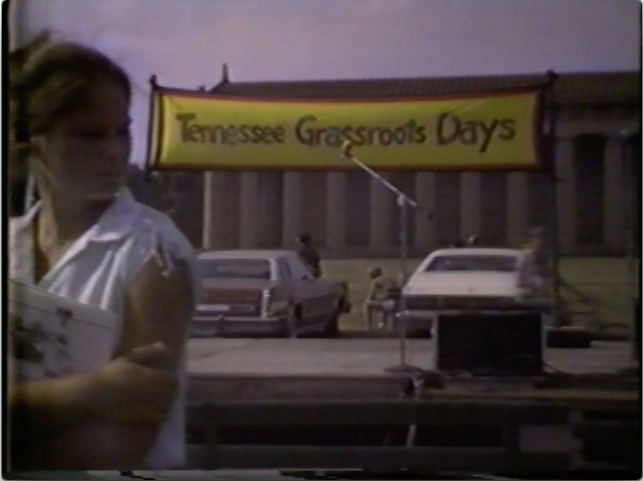 Held in Nashville’s Centennial Park in 1980, this video features performances by Leola Cullum, Gospel Stirrers, Bud Garrett, Lizzie Cheatham, Nimrod Workman, Jo-El Sonnier with Frazier Moss, Sam’s Ramblers, and Hazel Dickens. Also included are shots of the festival grounds, with demos spanning quilt-making to beekeeping.
Held in Nashville’s Centennial Park in 1980, this video features performances by Leola Cullum, Gospel Stirrers, Bud Garrett, Lizzie Cheatham, Nimrod Workman, Jo-El Sonnier with Frazier Moss, Sam’s Ramblers, and Hazel Dickens. Also included are shots of the festival grounds, with demos spanning quilt-making to beekeeping.
Additional footage, PSAs and television coverage of annual Grassroots Days through the 80s can be found in the Southern Folk Cultural Revival Project Collection (#20004)
VT-20466/5: James “Son Ford” Thomas at Bacchus, Newark, Del., winter 1978
I highlighted a different James “Son Ford” Thomas video in the Robert Bethke Collection (#20466) in a previous post, in which he performed with George Thorogood and Ron Smith. Primarily playing solo, but joined by Ron Smith eventually, this performance takes place at the University of Delaware’s Bacchus Theater.
VT-20018/1 & VT-20018/2: Walter Raleigh Babson at UNC Chapel Hill with Andy Cahan, 1987
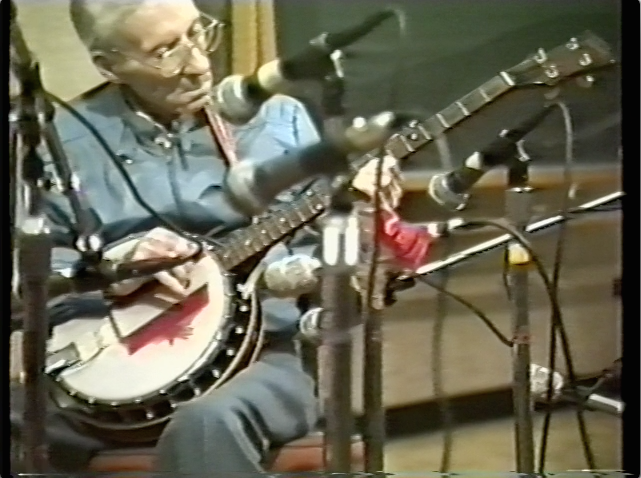 Walter Raleigh Babson performed twice at Chapel Hill in 1987, including his last public concert with Andy Cahan on November 12th (VT-20018/2), 26 days before passing away. Along with the performance, this tape includes a retrospective of Babson’s life through home movies and photographs.
Walter Raleigh Babson performed twice at Chapel Hill in 1987, including his last public concert with Andy Cahan on November 12th (VT-20018/2), 26 days before passing away. Along with the performance, this tape includes a retrospective of Babson’s life through home movies and photographs.
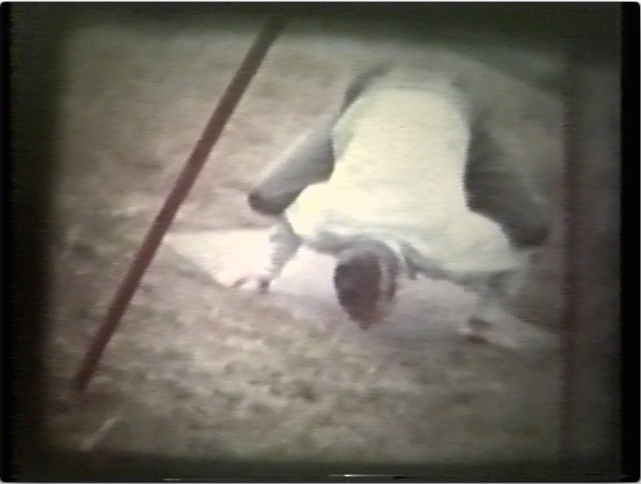
VT-20018/1 documents Babson’s performance earlier in 1987 at Gerrard Hall on March 28th for the Southern Accents Fine Arts Festival at UNC, where he is again joined by Andy Cahan. Additional audio recordings and interviews of Babson can be accessed in the Andy Cahan Collection (#20018).
VT-20379/20 part 1 and part 2: Gene Bluestein with Nona Beamer on Folk Sources in American Culture, 1986
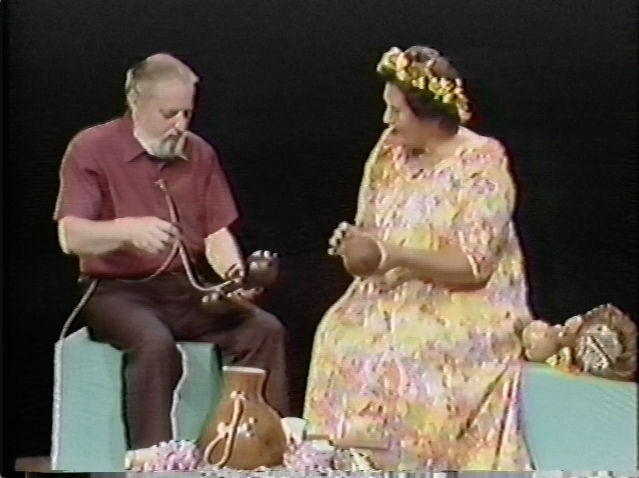
Gene Bluestein hosted a number of guests on his series Folk Sources in American Culture while at California State University. Many of these segments can be found in the Gene Bluestein collection (#20379). On this particular day, he hosted Nona Beamer, who shared examples of instruments and related Hawaiian folk traditions.
Martin Luther King, Jr. speaking from Birmingham, 1963
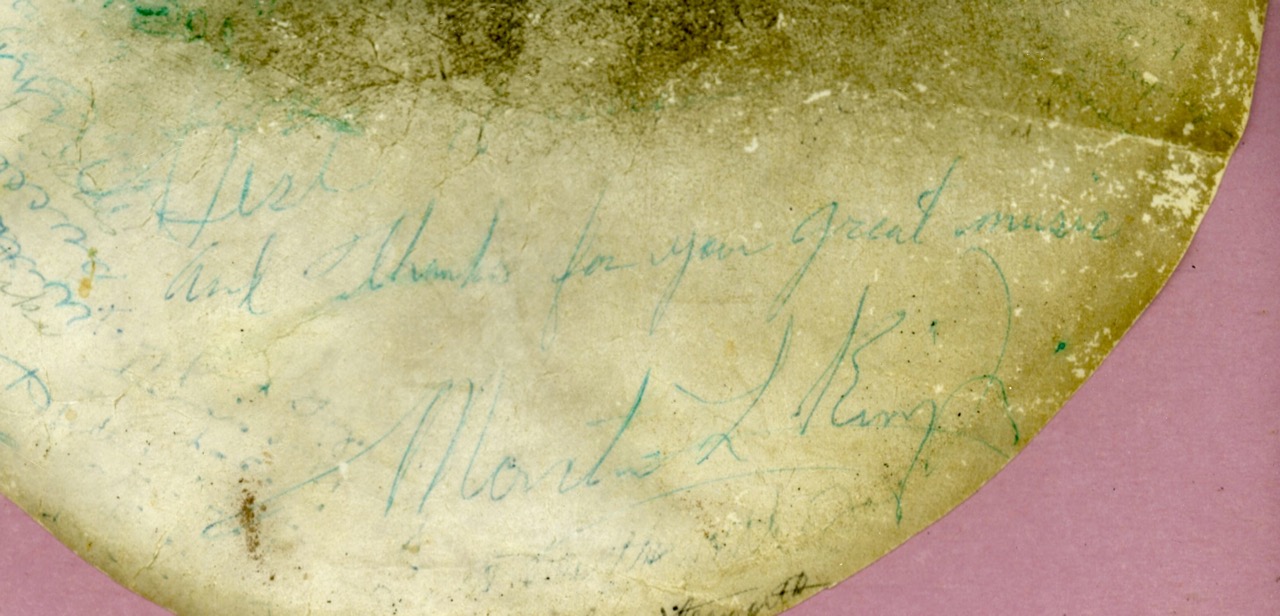 Like many of you today, we remember Dr. Martin Luther King, Jr. and his legacy by turning to his own voice and words. In that spirit we’d like to share a clip of a speech Dr. King made to a group of organizers and activists at a Mass Meeting in Birmingham, Alabama, April 1963, digitized from open reel tape recording FT-20008/9832 in the Guy and Candie Carawan Collection (20008). He addresses the audience with seriousness and humor, inspiring them to continue to fight for the cause and lifting them up in solidarity before they all join together to sing “We Shall Overcome”. Listen to those clips here or read the transcription below:
Like many of you today, we remember Dr. Martin Luther King, Jr. and his legacy by turning to his own voice and words. In that spirit we’d like to share a clip of a speech Dr. King made to a group of organizers and activists at a Mass Meeting in Birmingham, Alabama, April 1963, digitized from open reel tape recording FT-20008/9832 in the Guy and Candie Carawan Collection (20008). He addresses the audience with seriousness and humor, inspiring them to continue to fight for the cause and lifting them up in solidarity before they all join together to sing “We Shall Overcome”. Listen to those clips here or read the transcription below:
[Speaking: Rev. Charles Billups]:
Now let us join hands and let us sing together, “We Shall Overcome”
[singing]
We shall overcome
We shall overcome
We shall overcome someday,
Oh deep in my heart
I do believe
We shall overcome someday.
You can hear the entire tape, as well as interviews and comments from participating student actives, streaming through the Southern Folklife Collections digital collections here: FT-20008/9832. Digitized recordings in the Guy and Candie Carawan Collection have been made accessible through streaming thanks to SFC’s ongoing audiovisual preservation grant from the Andrew W. Mellon Foundation.
The photo above is a closeup of Guy Carawan’s banjo head (pictured in full below), signed by Martin Luther King, Jr. as well as other leaders like Rosa Parks, Mahalia Jackson, Septima Clark, Fred Shuttlesworth and more. If you are interested in other archival materials related to Martin Luther King, Jr. you may want to read an article from today’s News and Observer, April 4, 2018, “Martin Luther King, Jr. and Chapel Hill’s Jim Crow Past,” by journalist Mike Ongle. The article based on research across the collections at Wilson Special Collections Library and details Martin Luther King’s visit to Chapel Hill and UNC Chapel Hill in May of 1960, including photos from the John Kenyon Chapman Papers (05441) .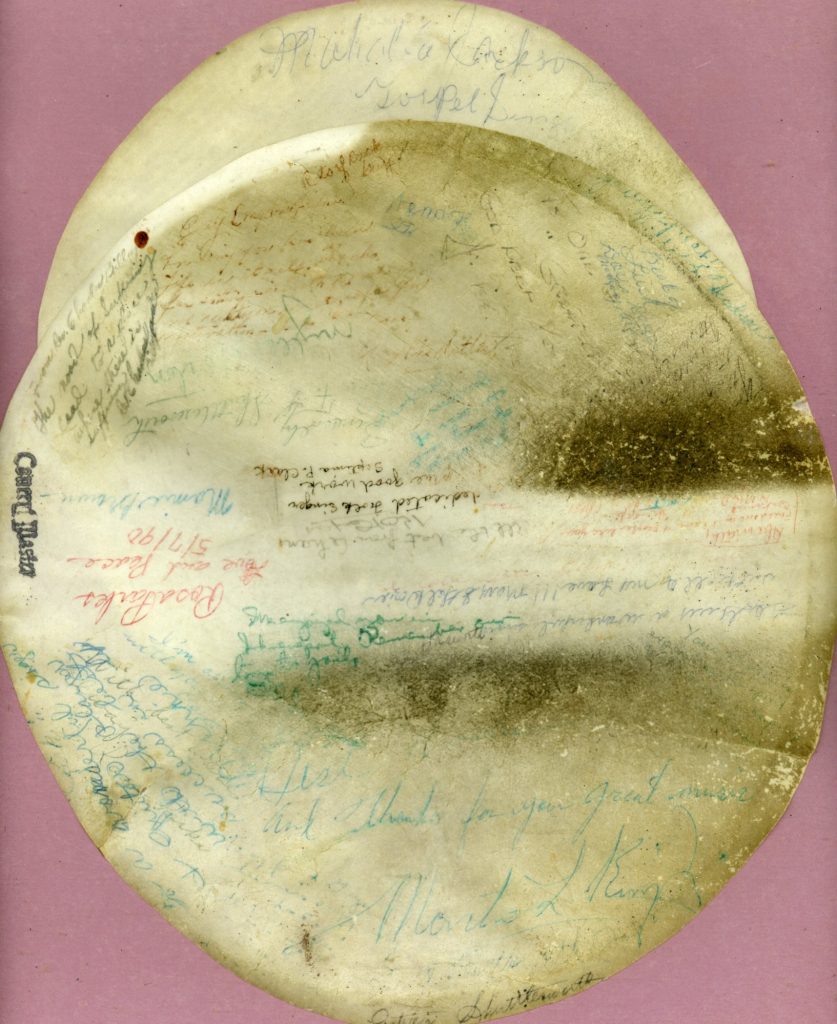
Now Available for Research: Joan Moser Collection
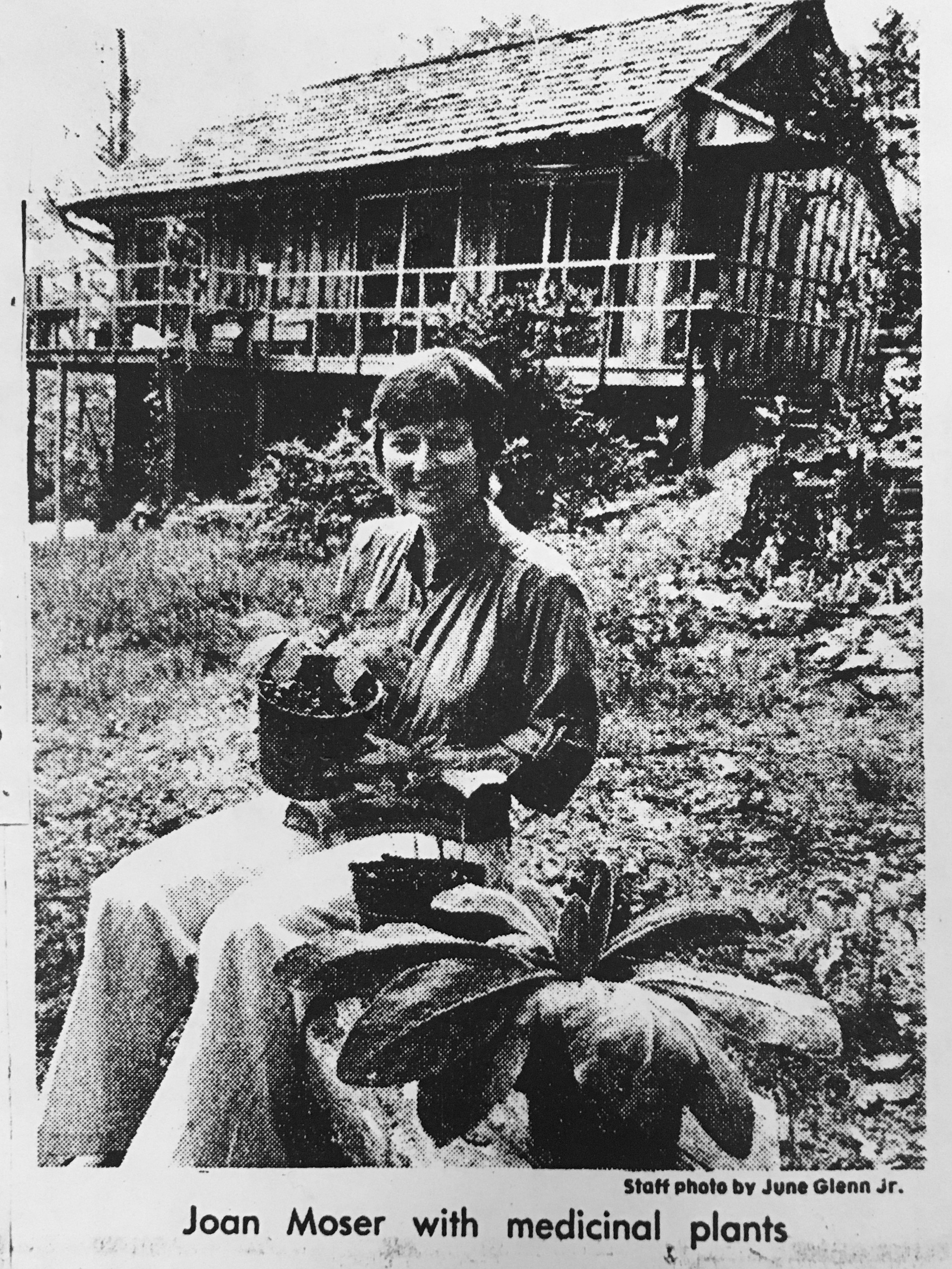
We recently published a finding aid for the Joan Moser Collection (20370), which contains the papers and audiovisual materials of the western North Carolina based folk musician and historian, Joan Moser. There’s a chance you may have heard of Joan’s father, Artus Moser, whose collection of papers also resides at the Southern Folklife Collection. Like her father, Joan studied and taught the music and folk traditions of Appalachia. She also played – guitar, banjo, lute, and dulcimer, to name a few.
Joan’s collection is made up mostly of open reel tapes that she compiled over the years. Thanks to SFC’s ongoing audiovisual preservation grant from the Andrew W. Mellon Foundation, the Joan Moser Collection is now available for research and her tapes have been queued up for digitization.
Many of the tapes found in her collection have close ties to the music and traditions of western North Carolina. Below is a visual sampling of these tapes, including live recordings from the Asheville Mountain Dance and Folk Festival and recordings made at the Moser family home in Swannanoa, N.C., located on Buckeye Cove in Buncombe County.
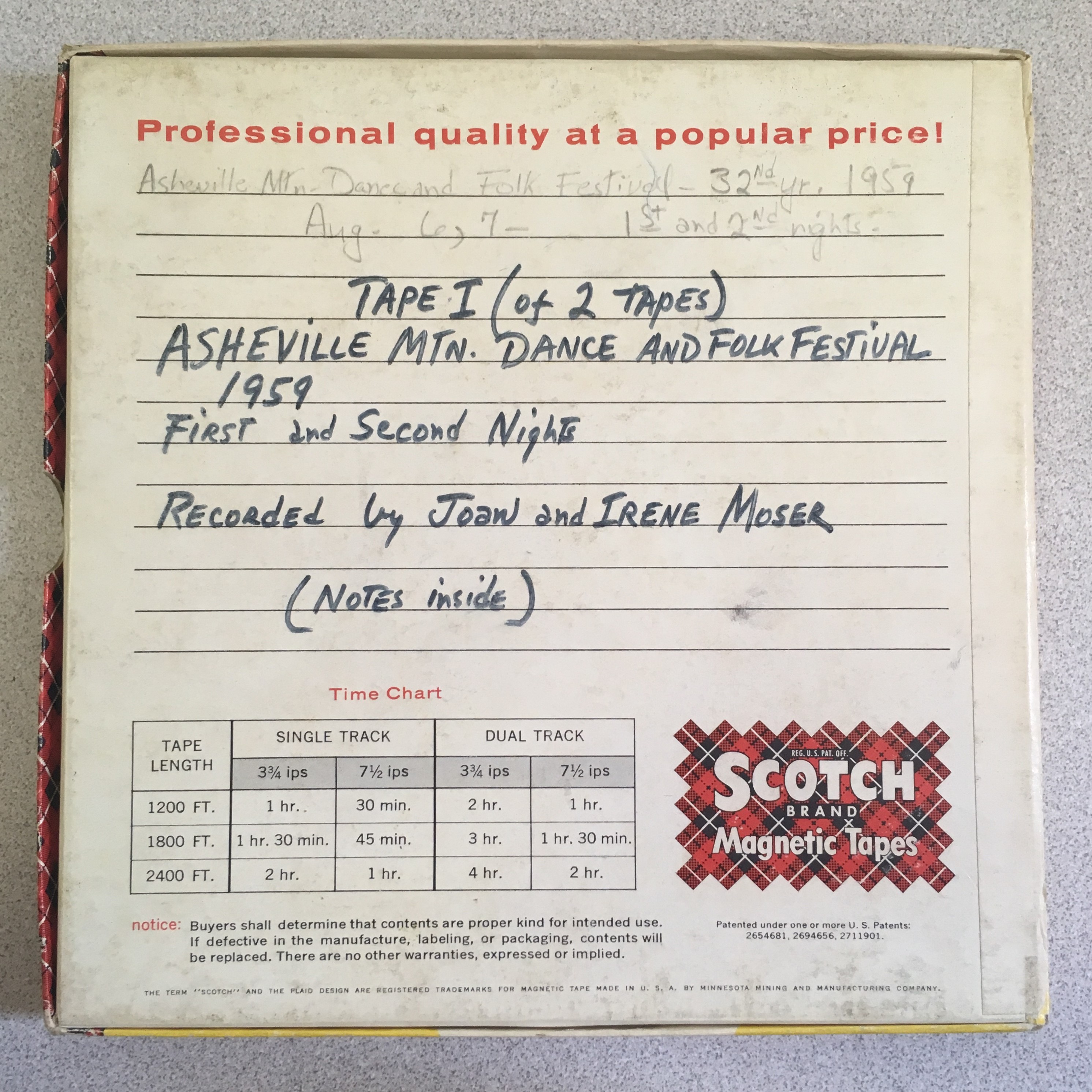
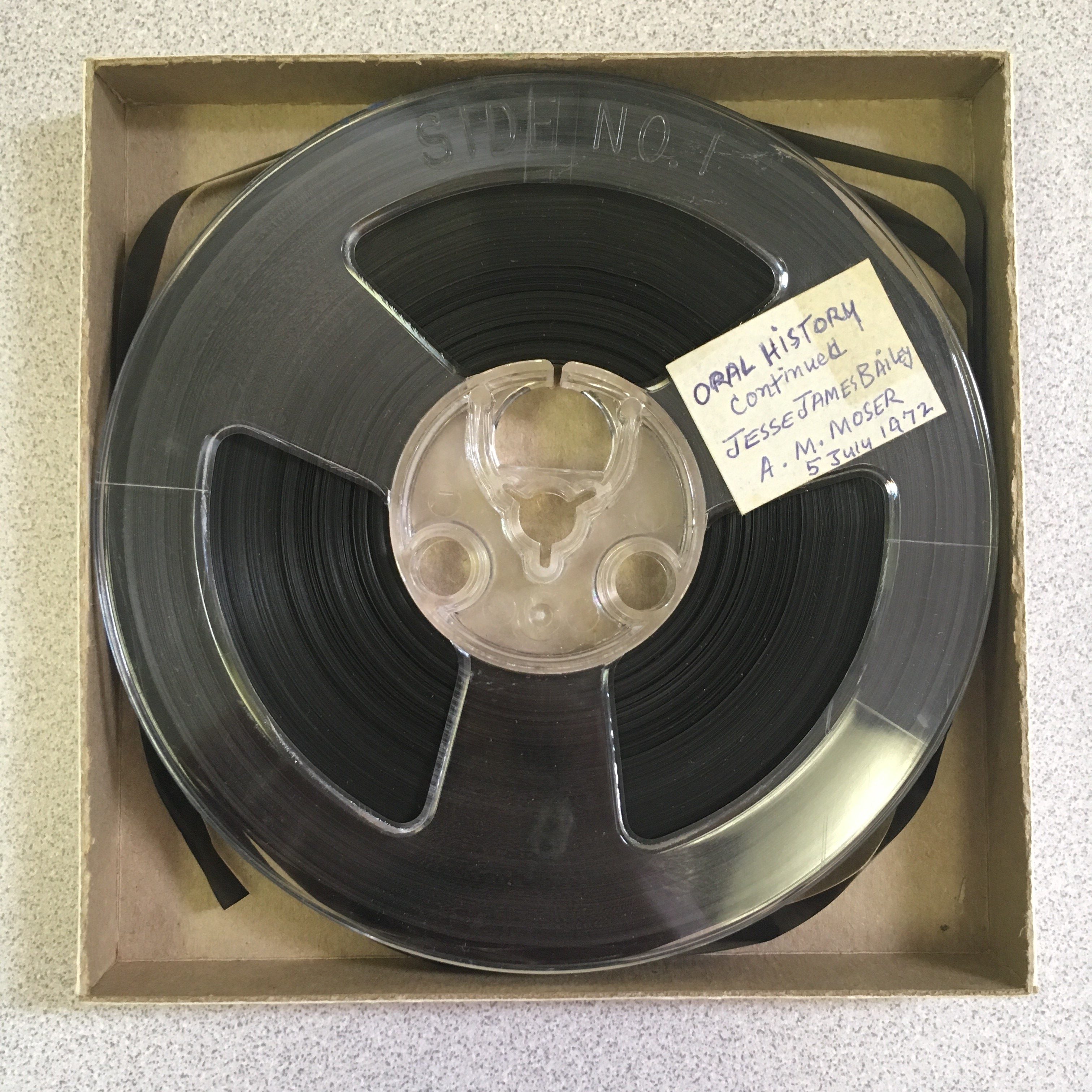
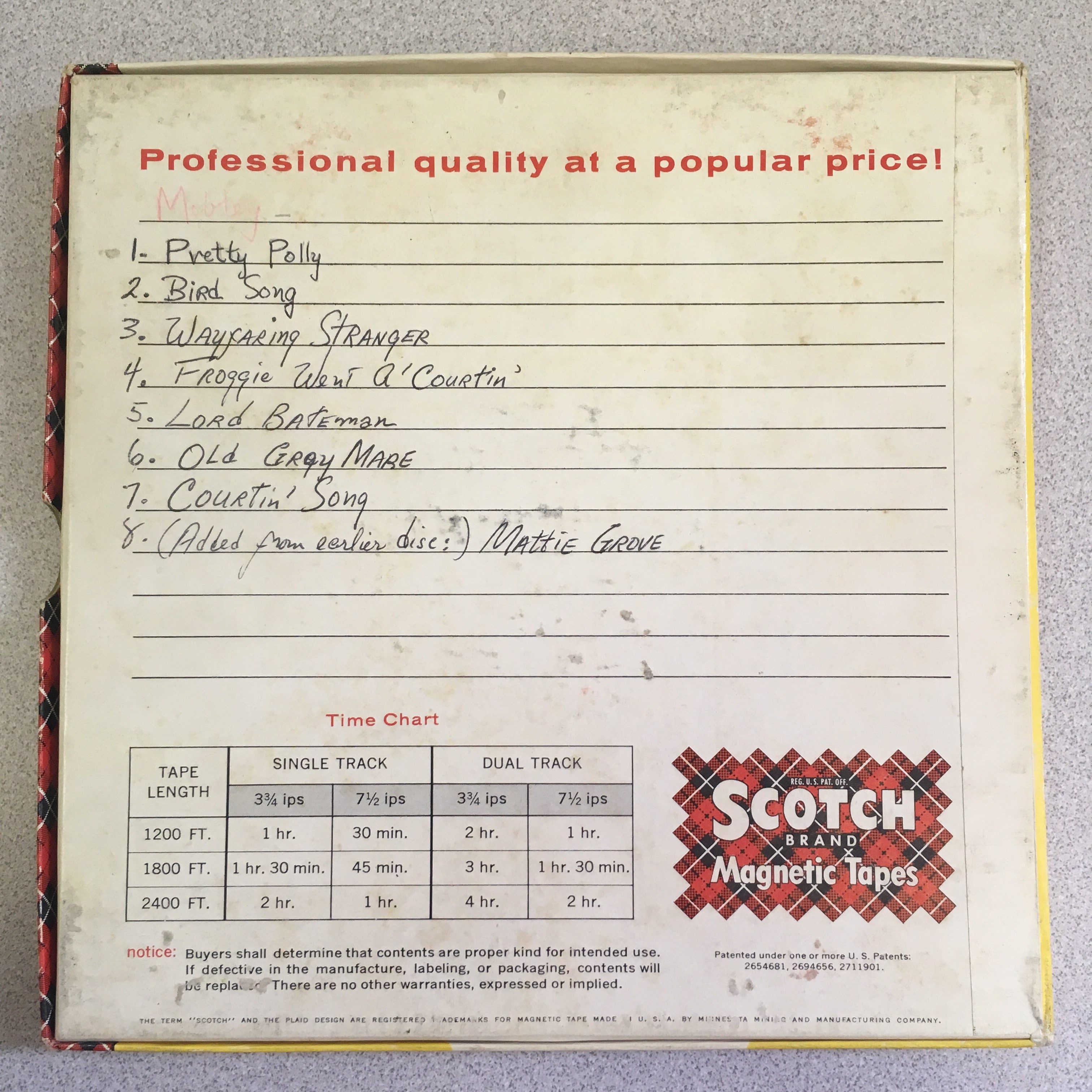
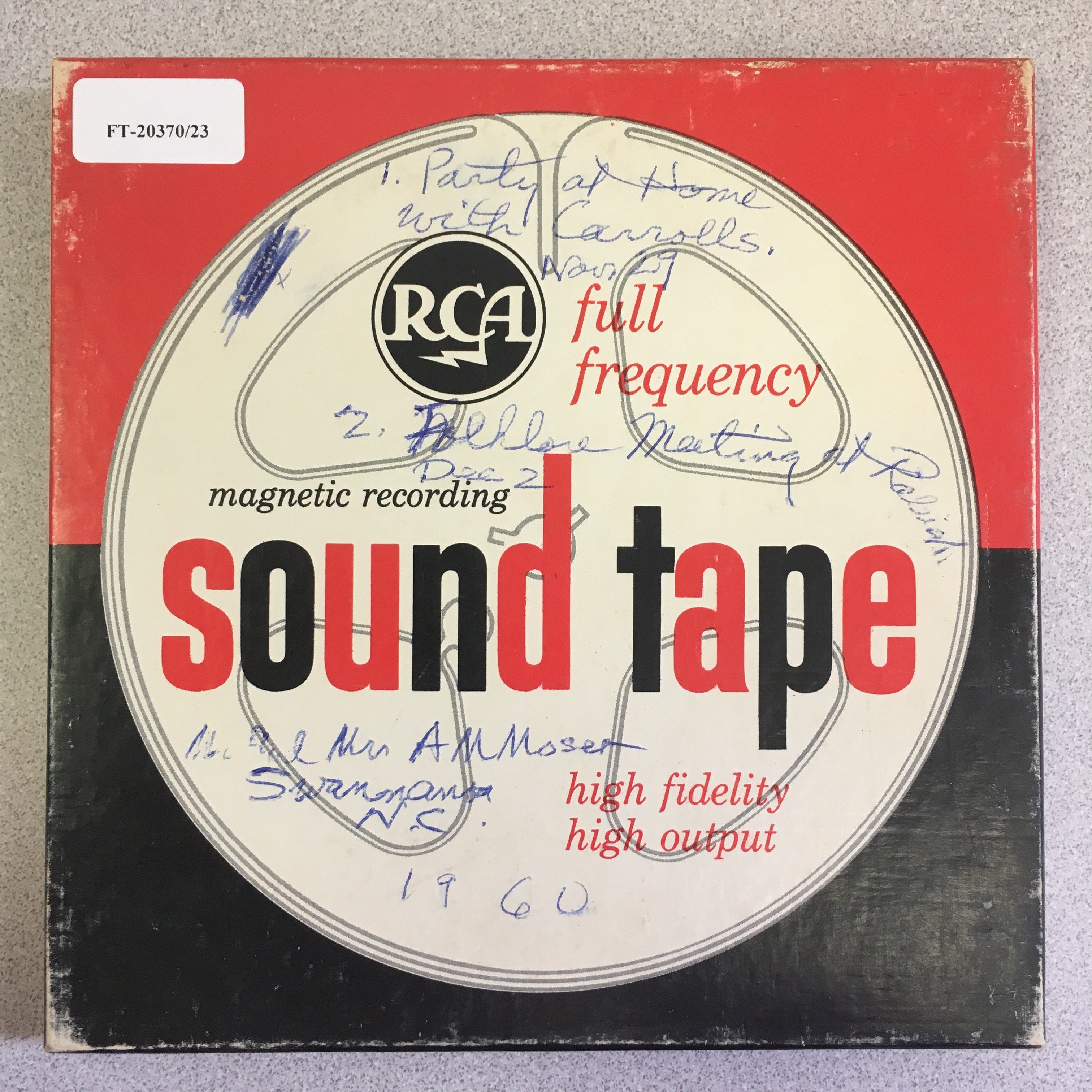
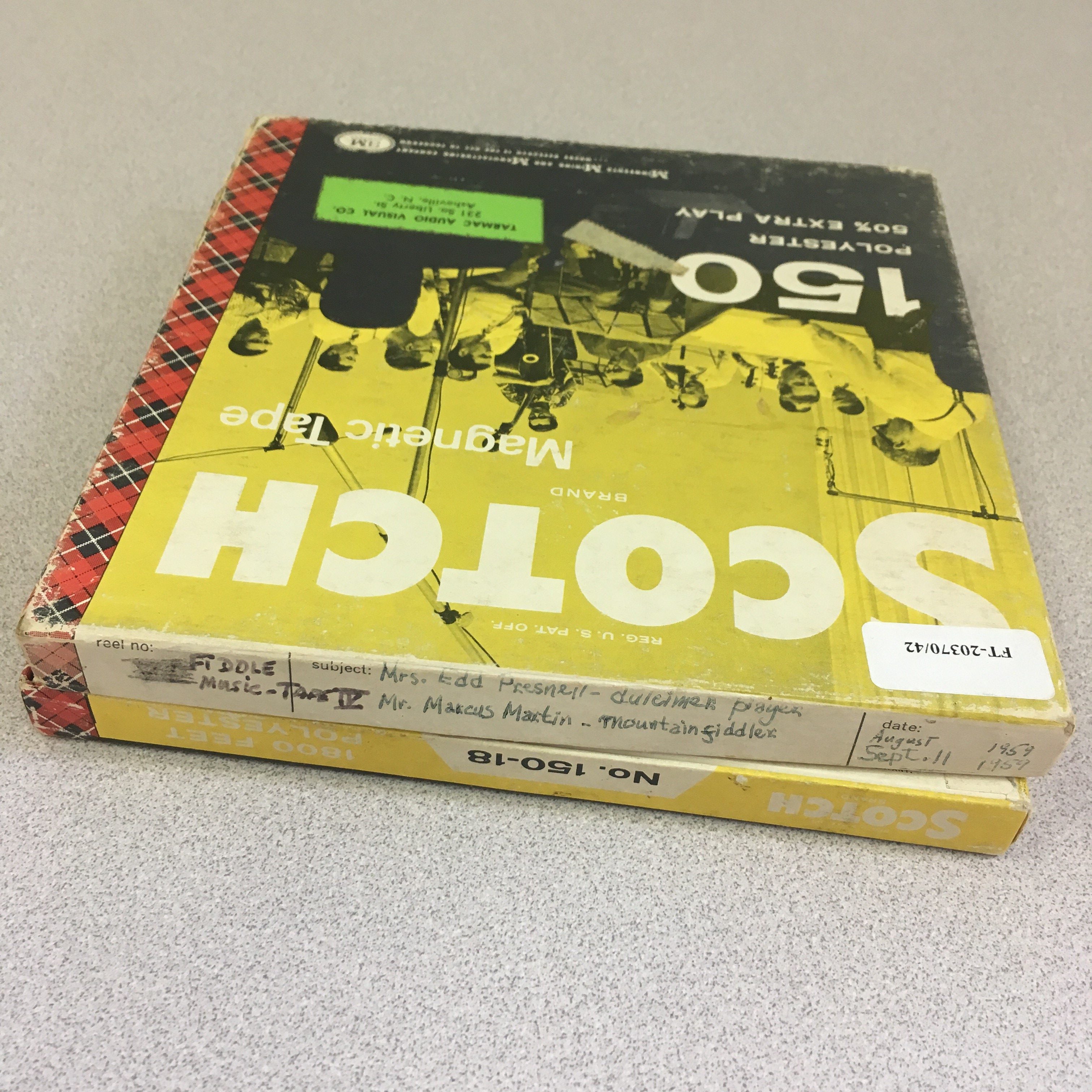
Documenting the origins of SNCC in the Guy and Candie Carawan Collection

Our colleagues at Duke University are hosting a conference March 23-March 24 to honor the work of the Student Nonviolent Coordinating Committee and the creation of the SNCC Digital Gateway, a “documentary website tells the story of how young activists in SNCC united with local people in the Deep South to build a grassroots movement for change that empowered the Black community and transformed the nation.” [“About,” SNCC Digital Gateway]
In solidarity with the conference and the SNCC Legacy Project, we present these two images from the Guy and Candie Carawan Collection (20008). The top image shows the back of Guy Carawan singing to the audience in an auditorium at Shaw University in Durham, April 1960. Brought together by the encouragement of SCLC Executive Director Ella Baker and Dr. Martin Luther King, Jr., the protest leaders founded SNCC at this meeting.
The image below shows the members of newly founded SNCC demonstrating the power of music and the movement at Fisk University. Guy Carawan is playing guitar, Candie Carawan is second from the left in the back row, and Congressman John Lewis is at the far right. These images serve as a powerful reminder that youth have been, and remain, at the forefront of activism advocating for social change.
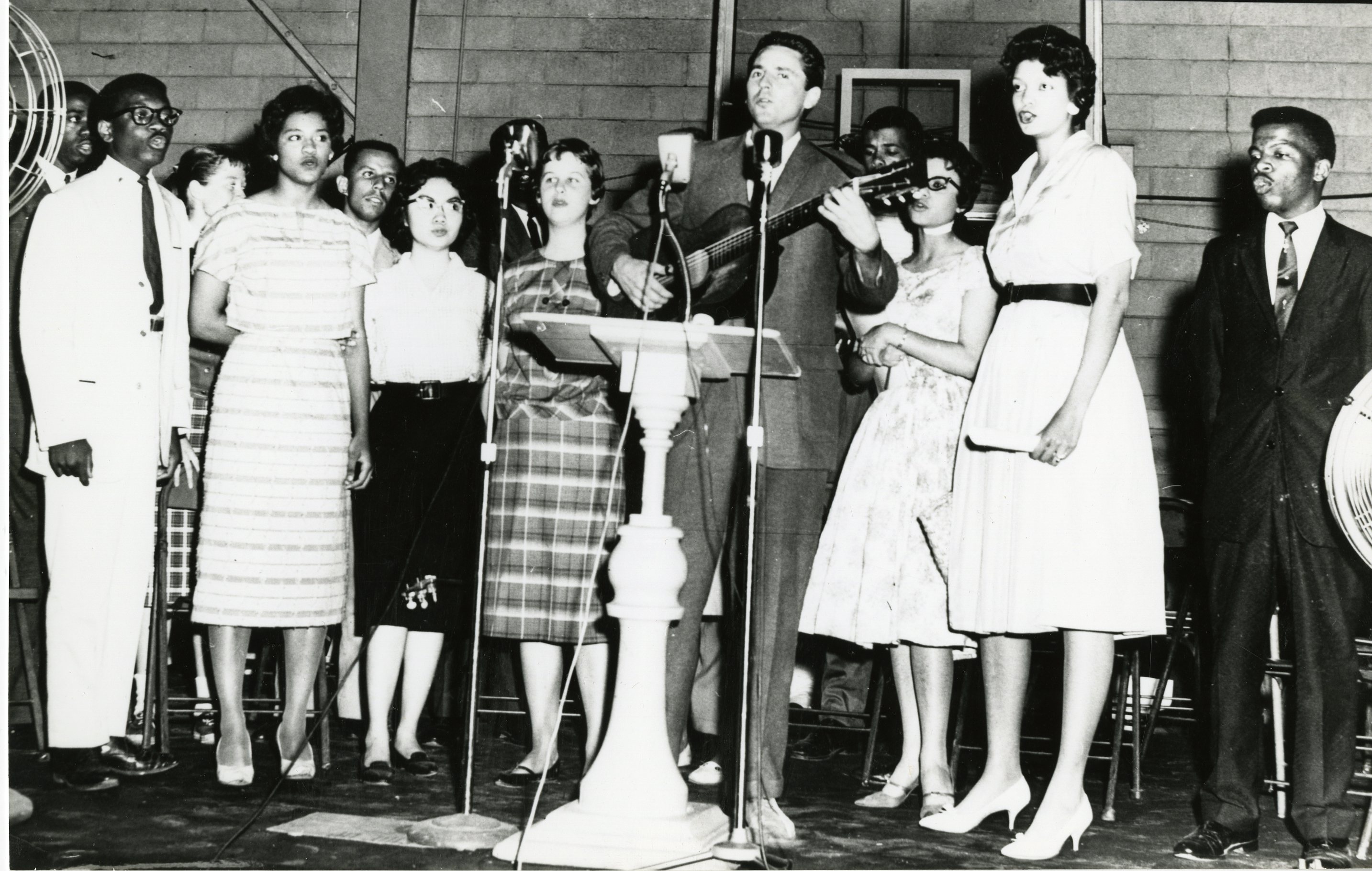
Doc Watson, Live At Club 47 Out February 9, 2018
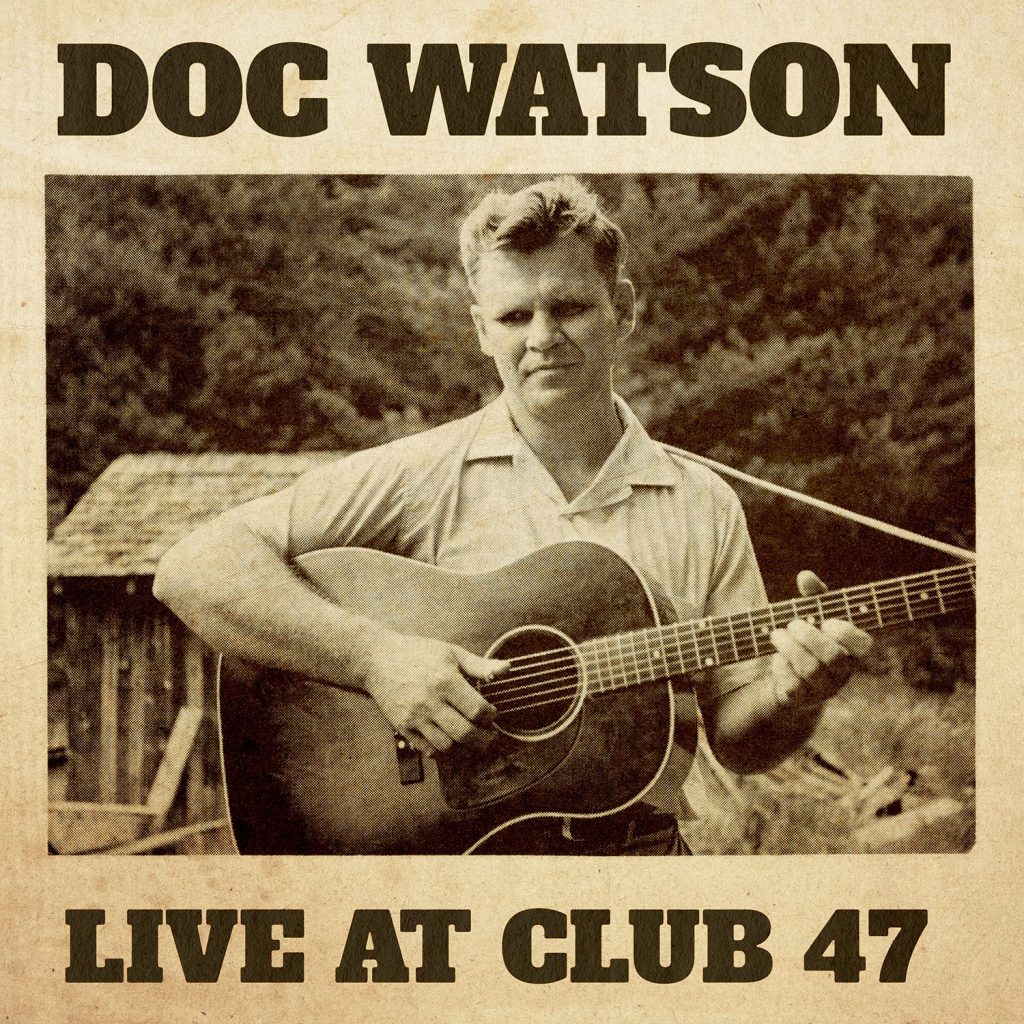 Doc Watson, Live At Club 47 Out February 9, 2018
Doc Watson, Live At Club 47 Out February 9, 2018
Pre-order Doc Watson, Live At Club 47 HERE!
Yep Roc Records and the Southern Folklife Collection at the University of North Carolina at Chapel Hill Libraries announce the release of Doc Watson, Live at Club 47, set for a February 9 release on CD and digital, nearly 55 years to the date of the original recording. The LP release will follow April 27. The album is now available for pre-order.
Recorded live February 10, 1963 at Club 47 in Cambridge, MA, today known as Club Passim, this never-before-heard album features four previously unreleased songs from Doc’s early repertoire, in addition to performances of Doc’s favorite songs of the Carter Family, Frank Hutchison, Charlie Poole, and Merle Travis. Doc is accompanied by John Herald and Ralph Rinzler of The Greenbrier Boys on five of the album’s tracks. Here is the schedule from Club 47 as printed in The Broadside of Boston, volume 1, no. 24, Feb. 8, 1963 from the Southern Folklife Collection Serials (30017)
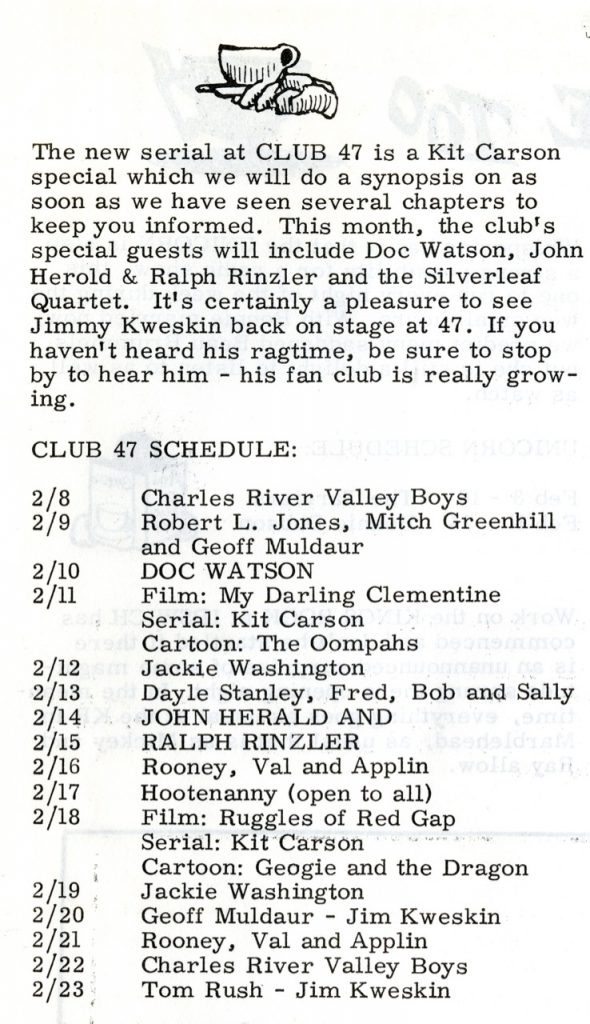
In celebration of the release, Club Passim, the UNC Libraries’ Southern Folklife Collection and Yep Roc Records present an evening with songwriter, multi-instrumentalist, and IBMA guitarist of the year Molly Tuttle February 13. Tickets are on sale and available here.
“This recording documents a pivotal moment in virtuoso Doc Watson’s early solo career,” notes Steven Weiss, director of the Southern Folklife Collection. “This is Doc, paying his dues and playing his heart out, performing two sets of classic, old-time country songs he learned as a child from his family and from old 78 RPM records.”
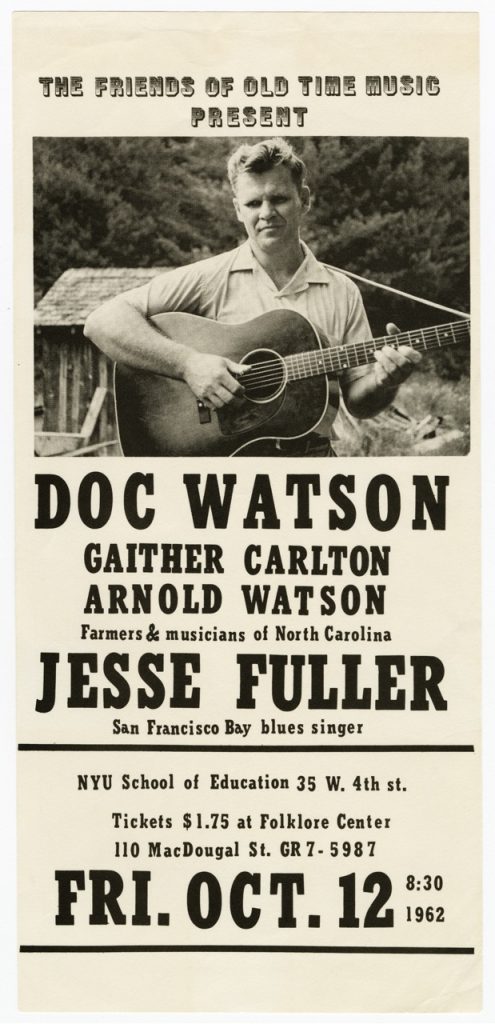
Following the success of the Club 47 show, Doc was booked at the 1963 Newport Folk Festival and released his debut solo album on Vanguard Records in 1964. He went on to become America’s premier folk guitarist earning seven Grammy Awards, a Lifetime Achievement Award from the National Academy of Recording Arts & Sciences, and in 1997 was presented with the National Medal of Arts at the White House by then-President Bill Clinton, who introduced him saying, “There may not be a serious, committed baby boomer alive who didn’t spend at least some of his or her youth trying to learn to pick guitar like Doc Watson.”
Doc Watson, Live at Club 47 Track listing:
- Wabash Cannonball – A.P. Carter
- The House Carpenter — Traditional
- I Wish I Was Single Again** – Traditional
- Little Darling Pal of Mine – A.P. Carter
- Train That Carried My Girl from Town – Doc Watson
- The Worried Blues –Traditional
- Old Dan Tucker** – Traditional
- Sweet Heaven When I Die – Claude Grant
- The Talking Blues – Chris Bouchillon
- Little Margaret** — Traditional
- Sitting on Top of the World – Lonnie Carter and Walter Jacobs
- Don’t Let Your Deal Go Down – Doc Watson
- Blue Smoke – Merle Travis
- Deep River Blues – Doc Watson
- Way Down Town (w/ Ralph Rinzler and John Herald) – Doc Watson
- Somebody Touched Me (w/ Ralph Rinzler and John Herald) – Doc Watson
- Billy in the Low Ground (w/ John Herald) – Traditional
- Boil Them Cabbage Down – Traditional
- Everyday Dirt – David McCarn
- I Am a Pilgrim – Merle Travis
- No Telephone in Heaven – A.P. Carter
- Hop High Ladies the Cake’s All Dough** –Traditional
- Little Sadie – Doc Watson
- Black Mountain Rag (w/ John Herald) – Doc Watson
- Blackberry Rag (w/ John Herald) – Doc Watson
- Days of My Childhood Plays – Alfred G. Karnes
John Herald (guitar and harmony vocals). Tracks 15, 16 (second guitar) 17, 24, 25.
Ralph Rinzler (mandolin and harmony vocals). Tracks 15, 16.
**previously unreleased tracks.
Pre-order Doc Watson, Live At Club 47 HERE!

